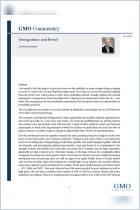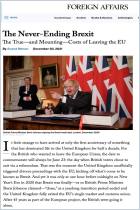Melden Sie sich bei getAbstract an, um die Zusammenfassung zu erhalten.

Melden Sie sich bei getAbstract an, um die Zusammenfassung zu erhalten.
Thiemo Fetzer
Did Austerity Cause Brexit?
CESifo Group Munich, 2018
Was ist drin?
Austerity was a material factor in the United Kingdom’s vote to leave the European Union.
Recommendation
Policy decisions have consequences. This is the essential lesson of Brexit, economist Thiemo Fetzer concludes in this original and broad-based research. He finds that populism in the United Kingdom, fomented by austerity cuts to social programs, boiled over into dissent significant enough to inflict long-lasting political and economic disruption. getAbstract recommends this noteworthy report on the reverberating effects of fiscal decisions to policy experts, regulators and business leaders, all of whom must now reckon with the long-term impacts of Brexit.
Summary
About the Author
Thiemo Fetzer is an assistant professor of economics at the University of Warwick.


















Comment on this summary